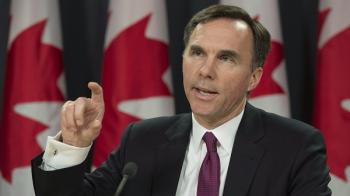Image Caption
Summary
By Shari Narine
Windspeaker.com Contributor
First Nations may be able to say good riddance to heavy financial loads or get out from under third party management if the federal government would just forgive their treaty negotiation loans, as promised in the Liberals’ February 2018 budget.
“There are lot of communities that are in third party and this is just one of the things that is holding us down,” said Jacqueline Thomas, chief of Saik’uz First Nation, B.C.
Thomas seconded the resolution made at the Assembly of First Nations’ general assembly in July, which called for the federal government to implement treaty loan forgiveness. Moved by Chief Ann Louie of the Williams Lake Indian Band, the resolution passed by consensus.
The commitment to lift the debt that is weighing Indigenous nations down, acquired from participation in the treaty process, was met with relief. Finance Minister Bill Morneau didn’t offer any dollar figure in the 2018 budget to go along with the forgiveness commitment. Now five months have passed and there has been no movement on that promise.
“Time keeps ticking and we still don’t have this thing resolved,” said Thomas, who said she has written letters to the government requesting forgiveness for her nation’s $1.8 million loan, but has yet to hear back. Until that loan is forgiven it remains a liability on Saik’uz First Nation’s financial statement, she says.
“This is why I’m keeping the pressure up. I’m keeping the pressure up on them.”
To take part in treaty-making work, nations were advanced eighty per cent of the dollars by Canada. The other 20 per cent required was split two-thirds/one-third between the federal government and the province, respectively. Loan advances would end at least 30 days prior to the three parties – federal government, provincial, and the First Nation – signing a final agreement.
According to the BC Treaty Commission’s 2017 annual report, since negotiations through BCTC began in May 1993, the commission has allocated approximately $707 million in negotiation support funding, with $551 million of that as loans. The money has been advanced to 60 First Nations. Outstanding loans total about $537 million.
A report prepared for the then-Conservative federal government in 2015 by special advisor Doug Eyford found that the average negotiating time for a treaty was 15 years.
Since 1973 when Canada signalled it would negotiation treaties across the country, 26 modern treaties have been concluded and there were 75 treaty negotiations across Canada at various stages of progress. Since 1973, Canada has advanced in excess of $1 billion to Aboriginal groups through loans and contributions. In this same time frame, approximately $70 million in loans were in the process of being repaid, while the negotiation loans of 15 modern treaty groups had been repaid in full.
Louie’s resolution also calls for the First Nations who have repaid the negotiation loans to be fully reimbursed.
The resolution says everything needs to be put in legal binding agreements.
“That’s important because we need something that gives us the assurance at each community level. There are issues with Canada not keeping their word. Every government since Confederation has issues with keeping their word,” said Thomas.
Thomas said the Trudeau government needs to deliver.
“We’re talking reconciliation. This should be a no brainer. Just do it,” she said.
The AFN was directed through the resolution to work with the federal government to ensure that the commitment to negotiate loan forgiveness and reimbursement is fully implemented in the 2018-19 fiscal year.

